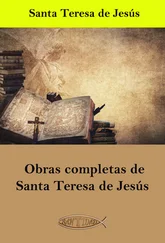15. I must now return to that which has been enjoined me. I say, that if I had to describe minutely how our Lord dealt with me in the beginning, it would be necessary for me to have another understanding than that I have: so that I might be able to appreciate what I owe to Him, together with my own ingratitude and wickedness; for I have forgotten it all.
May He be blessed for ever Who has borne with me so long! Amen.
1Antonio de Ahumada; who, according to the most probable opinion, entered the Dominican monastery of St. Thomas, Avila. It is said that he died before he was professed. Some said he joined the Hieronymites; but this is not so probable ( De la Fuente ). Ribera, however, says that he did enter the novitiate of the Hieronymites. but died before he was out of it (lib. i. ch. vi.).
2Juana Suarez, in the Monastery of the Incarnation, Avila.
3See Relation , vi. § 3.
4The nuns sent word to the father of his child's escape, and of her desire to become a nun, but without any expectation of obtaining his consent. He came to the monastery forthwith, and "offered up his Isaac on Mount Carmel" (Reforma, lib. i. ch. viii. § 5).
5The Saint entered the Monastery of the Incarnation Nov. 2, 1533, and made her profession Nov. 3, 1534 ( Bollandists and Bouix ). Ribera says she entered November 2, 1535; and the chronicler of the Order, relying on the contract by which her father bound himself to the monastery, says that she took the habit Nov. 2, 1536, and that Ribera had made a mistake.
6Her father took her from the monastery in the autumn of 1535, according to the Bollandists, but of 1538, according to the chronicler, who adds, that she was taken to her uncle's house--Pedro Sanchez de Cepeda--in Hortigosa, and then to Castellanos de la Cañada, to the house of her sister, Doña Maria, where she remained till the spring, when she went to Bezadas for her cure (Reforma, lib. i. ch. xi. § 2).
7It was in 1563 that all nuns were compelled to observe enclosure ( De la Fuente ).
8Ch. v. § 15.
9Ch. iii. § 4.
10Ch. iii. § 5.
11By Fray Francisco de Osuna, of the Order of St. Francis (Reforma, lib. i. ch. xi. § 2).
12See ch. ix. §§ 4, 7.
Table of Contents
Illness and Patience of the Saint. The Story of a Priest Whom She Rescued from a Life of Sin.
1. I forgot to say how, in the year of my novitiate, I suffered much uneasiness about things in themselves of no importance; but I was found fault with very often when I was blameless. I bore it painfully and with imperfection; however, I went through it all, because of the joy I had in being a nun. When they saw me seeking to be alone, and even weeping over my sins at times, they thought I was discontented, and said so.
2. All religious observances had an attraction for me, but I could not endure any which seemed to make me contemptible. I delighted in being thought well of by others, and was very exact in everything I had to do. All this I thought was a virtue, though it will not serve as any excuse for me, because I knew what it was to procure my own satisfaction in everything, and so ignorance does not blot out the blame. There may be some excuse in the fact that the monastery was not founded in great perfection. I, wicked as I was, followed after that which I saw was wrong, and neglected that which was good.
3. There was then in the house a nun labouring under a most grievous and painful disorder, for there were open ulcers in her body, caused by certain obstructions, through which her food was rejected. Of this sickness she soon died. All the sisters, I saw, were afraid of her malady. I envied her patience very much; I prayed to God that He would give me a like patience; and then, whatever sickness it might be His pleasure to send, I do not think I was afraid of any, for I was resolved on gaining eternal good, and determined to gain it by any and by every means.
4. I am surprised at myself, because then I had not, as I believe, that love of God which I think I had after I began to pray. Then, I had only light to see that all things that pass away are to be lightly esteemed, and that the good things to be gained by despising them are of great price, because they are for ever. His Majesty heard me also in this, for in less than two years I was so afflicted myself that the illness which I had, though of a different kind from that of the sister, was, I really believe, not less painful and trying for the three years it lasted, as I shall now relate.
5. When the time had come for which I was waiting in the place I spoke of before 1--I was in my sister's house, for the purpose of undergoing the medical treatment--they took me away with the utmost care of my comfort; that is, my father, my sister, and the nun, my friend, who had come from the monastery with me,--for her love for me was very great. At that moment, Satan began to trouble my soul; God, however, brought forth a great blessing out of that trouble.
6. In the place to which I had gone for my cure lived a priest of good birth and understanding, with some learning, but not much. I went to confession to him, for I was always fond of learned men, although confessors indifferently learned did my soul much harm; for I did not always find confessors whose learning was as good as I could wish it was. I know by experience that it is better, if the confessors are good men and of holy lives, that they should have no learning at all, than a little; for such confessors never trust themselves without consulting those who are learned--nor would I trust them myself: and a really learned confessor never deceived me. 2Neither did the others willingly deceive me, only they knew no better; I thought they were learned, and that I was not under any other obligation than that of believing them, as their instructions to me were lax, and left me more at liberty--for if they had been strict with me, I am so wicked, I should have sought for others. That which was a venial sin, they told me was no sin at all; of that which was most grievously mortal, they said it was venial. 3
7. This did me so much harm, that it is no wonder I should speak of it here as a warning to others, that they may avoid an evil so great; for I see clearly that in the eyes of God I was without excuse, that the things I did being in themselves not good, this should have been enough to keep me from them. I believe that God, by reason of my sins, allowed those confessors to deceive themselves and to deceive me. I myself deceived many others by saying to them what had been said to me.
8. I continued in this blindness, I believe, more than seventeen years, till a most learned Dominican Father 4undeceived me in part, and those of the Company of Jesus made me altogether so afraid, by insisting on the erroneousness of these principles, as I shall hereafter show. 5
9. I began, then, by going to confession to that priest of whom I spoke before. 6He took an extreme liking to me, because I had then but little to confess in comparison with what I had afterwards; and I had never much to say since I became a nun. There was no harm in the liking he had for me, but it ceased to be good, because it was in excess. He clearly understood that I was determined on no account whatever to do anything whereby God might be seriously offended. He, too, gave me a like assurance about himself, and accordingly our conferences were many. But at that time, through the knowledge and fear of God which filled my soul, what gave me most pleasure in all my conversations with others was to speak of God; and, as I was so young, this made him ashamed; and then, out of that great goodwill he bore me, he began to tell me of his wretched state. It was very sad, for he had been nearly seven years in a most perilous condition, because of his affection for, and conversation with, a woman of that place; and yet he used to say Mass. The matter was so public, that his honour and good name were lost, and no one ventured to speak to him about it. I was extremely sorry for him, because I liked him much. I was then so imprudent and so blind as to think it a virtue to be grateful and loyal to one who liked me. Cursed be that loyalty which reaches so far as to go against the law of God. It is a madness common in the world, and it makes me mad to see it. We are indebted to God for all the good that men do to us, and yet we hold it to be an act of virtue not to break a friendship of this kind, though it lead us to go against Him. Oh, blindness of the world! Let me, O Lord, be most ungrateful to the world; never at all unto Thee. But I have been altogether otherwise through my sins.
Читать дальше












